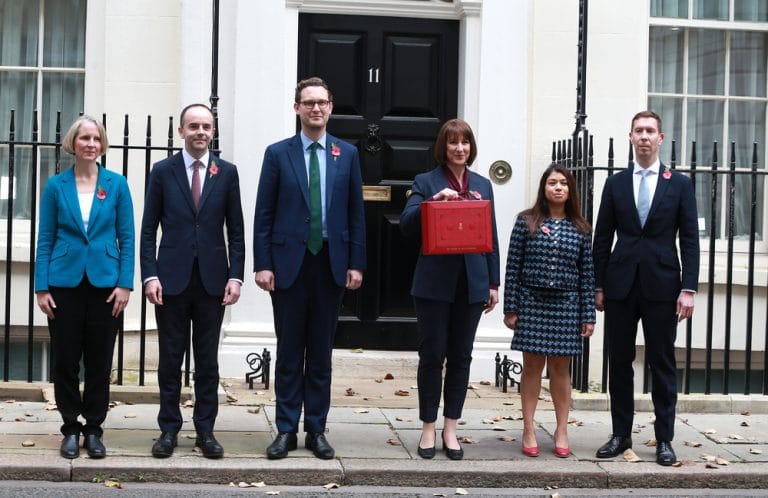🎧 Listen to This Article
As the UK government grapples with a £5.2 billion ($6.7 billion) fiscal shortfall, calls for a tax on the wealthiest individuals have resurfaced—sparking sharp debate over its economic viability, policy design, and long-term impact.
Prime Minister Keir Starmer has so far avoided committing to a wealth tax, stating in the House of Commons: “We can’t just tax our way to growth.” However, Labour’s recent struggles to pass welfare reform, combined with slowing GDP and rising public pressure, are forcing the conversation into the spotlight.
Former Labour leader Neil Kinnock reignited the issue by proposing a 2% annual tax on individual net wealth exceeding £10 million, a threshold that would affect roughly 20,000 people, or just 0.04% of the population.
How Much Revenue Could a Wealth Tax Generate?
Advocacy groups like the Tax Justice Network estimate such a levy could raise up to £25 billion ($32 billion) annually. However, experts caution that real-world yields are likely to be lower once behavioral responses and tax planning are factored in.
Dr. Arun Advani, director at the Centre for the Analysis of Taxation at the University of Warwick, projects that a 1% tax might realistically bring in £12 billion–13 billion ($15–16 billion)—but warns that doubling the rate won’t necessarily double the revenue due to increased tax avoidance or capital flight.
“A wealth tax is feasible,” Advani said, “but it’s not a quick fix. Building a functional system would take years, not months.”
Public Sentiment Favors the Tax—Including Millionaires
According to a YouGov poll, 75% of UK voters support a tax on ultra-high-net-worth individuals, including:
- 88% of Labour supporters
- 62% of Conservatives
- 55% of Reform UK voters
Surprisingly, many millionaires agree. A survey by Patriotic Millionaires UK found:
- 80% of millionaires support a 2% tax on wealth above £10 million
- 76% would pay more tax to help reduce inequality and fund public services
“There’s plenty of wealth in the UK,” said member Stephen Kinsella, “but it’s trapped in too few hands. As patriotic millionaires, we’d be proud to contribute more.”
The Risks: Capital Flight and Administrative Complexity
Critics warn that a poorly designed wealth tax could prompt wealthy individuals to relocate. The Henley Private Wealth Migration Report 2025 projects that 16,500 millionaires will leave the UK this year—the highest such outflow globally.
While the Tax Justice Network disputes these figures, arguing that millionaire migration is negligible in practice, the perception of policy instability may still be driving departures.
Moreover, economists like Stuart Adam of the Institute for Fiscal Studies argue that an annual wealth tax could distort savings and investment. Instead, he advocates for comprehensive reform of capital income and inheritance taxes, which already capture many aspects of wealth.
Wealth Taxes Abroad: Limited Models, Mixed Results
Countries such as Norway, Spain, and Italy impose wealth taxes with limited scope—often excluding key asset classes like primary residences or pensions. France has debated similar measures, backed by Nobel laureates like Paul Krugman and Joseph Stiglitz, but faced legislative roadblocks.
Argentina introduced a one-time “solidarity tax” in 2021 to fund COVID-19 recovery, but implementation challenges and valuation difficulties limited its effectiveness.
Advani, who served on the UK’s Wealth Tax Commission, notes that “no country has implemented a fully successful, comprehensive wealth tax,” largely due to valuation inconsistencies and political resistance.
Conclusion: Long-Term Reform vs. Short-Term Fix
Despite widespread public support and political momentum, a UK wealth tax remains a complex and polarizing issue. While it may help address long-term inequality, its role in solving the immediate £5.2 billion fiscal gap is far from certain.
Experts broadly agree: Before introducing a new wealth tax, the government should first fix the inefficiencies in existing taxes on wealth, such as capital gains, property, and inheritance.
Whether the Labour government will act remains unclear—but the pressure, both economic and political, is mounting.
For further details, clarification, contributions, or any concerns regarding this article, please get in touch with us at editorial@tax.news. We value your feedback and are committed to providing accurate and timely information. Please note that our privacy policy will handle all inquiries.



